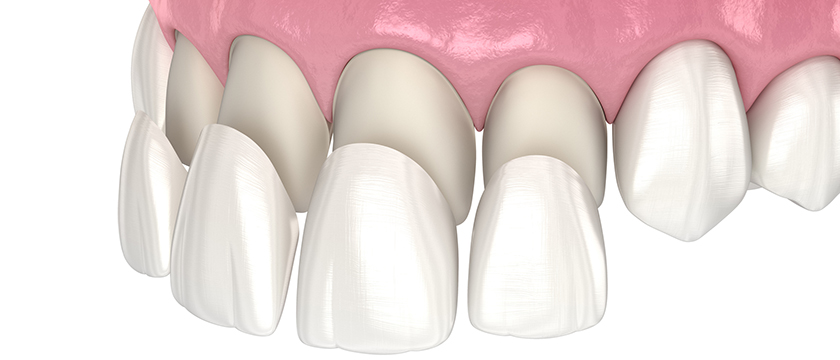 10 Aug 2022
10 Aug 2022
Many cosmetic dentistry treatments are available to help people improve the appearance of their smile, but few are as simple and flexible as dental veneers. These tiny prosthetics are the perfect solution for almost any cosmetic dental problem a person can have.
Considering getting dental veneers of your own? This guide will give you all the information you need to make your decision.
What Are Dental Veneers?
Dental veneers are thin tooth-coloured pieces of synthetic material that dentists place on the surface of their patient’s teeth. This gives those teeth a new, fresh appearance that still blends in with the rest of their smile.
Veneers are a permanent cosmetic enhancement. They cannot be removed, so it is important to be sure you really want them before getting them. Your dentist can help determine if you would be a good candidate.
What Do Dental Veneers Look Like?
Dental veneers look like enhanced versions of natural teeth. They may be used to give your teeth a more aesthetically pleasing shape, colour, or size. They can also cover up chips, cracks, pits, and stains that cannot be removed. They can even make your teeth look straighter than they really are.
Once your veneers are applied, they will look just as white, straight, and uniform as you have always wanted them to be.
How Do Dental Veneers Work?
Dental veneers work by camouflaging your natural teeth under a synthetic cover. The veneer sits on top of your natural tooth, transforming what that tooth looks like when viewed from the front. Underneath, the real tooth remains intact and can still carry out all of the same functions it did before it was altered.
Veneers can be applied to multiple teeth at once, or just one at a time. Many people choose to get veneers on their front teeth but not on the rest. Some dentists even offer partial veneers that you can get to cover up discoloured spots or odd-shaped areas on your teeth.
Types of Dental Veneers
Traditionally, two different types of veneers are used:
- Porcelain. Porcelain veneers are the most popular type. They are very strong and smooth enough to feel natural in your mouth while also providing superior aesthetics and stain resistance. They are more expensive than other options, but most patients feel the investment is more than worth it.
- Composite. Composite veneers are less expensive than porcelain veneers and can still produce an aesthetically appealing result. However, they cannot provide the same realistic translucency that porcelain can and often do not last as long.
Application Methods
Veneers may be applied to the teeth in two different ways.
- Direct Technique. This technique involves applying your dental veneers directly onto your teeth. Composite veneers are usually placed this way using many layers of material that are gradually shaped into the desired form. This technique allows the veneers to be adjusted immediately to suit your specifications, but the results are usually not as good as what you would get with fabricated veneers.
- Indirect Technique. This technique involves fabricating the veneers in a lab before cementing them to the teeth. Porcelain veneers are applied this way. Although dentists can still use their tools to reshape prefabricated veneers slightly, this technique does not allow for extensive last-minute adjustments. It does, however, provide extremely precise and aesthetically pleasing results.
What Does the Process Entail?
Getting veneers typically requires three appointments.
Appointment One: Dental Veneer Diagnosis and Planning
At your first appointment, you and your dentist will discuss what kind of veneers you want and where they will be placed.
Your dentist will also examine your teeth and gums to make sure you are a good candidate for veneers. If you have any untreated tooth decay or gum disease, you will need to receive treatment for these problems before you get your veneers.
Appointment Two: Getting Temporary Dental Veneers
Your dentist will place your temporary veneers on your teeth with a weak bonding agent and ask you to wear them for a few days. At the end of this period, you will be asked to give your feedback on your new look. This information will help your dentist perfect the colour and shape of your permanent veneers before they are cemented to your teeth.
Appointment Three: Placing the Dental Veneers
Your dentist will numb your mouth again and perform a deep cleaning of your teeth before bonding the veneers to their surface. During this process, they will remove approximately 0.3 to 0.5 mm of your enamel on each treated tooth. They may also make some small adjustments to your veneers to make their shape, size, colour, and other features better match the rest of your teeth and your bite.
Do Dental Veneers Hurt?
No, dental veneers do not hurt. Your dentist will numb your mouth during the placement process so you will not feel anything while they shave down your enamel.
Afterwards, some patients report mild sensitivity in their treated teeth. This is because the teeth with veneers on them no longer have as much enamel on them to insulate them against extreme temperatures. Most patients hardly notice the difference and are able to enjoy all of the same foods as they did before the procedure.
How Long Do Veneers Last?
High-quality dental veneers can last up to a decade and sometimes even longer. Their total lifespan will depend on how well you take care of them.
Taking Care of Your Dental Veneers
To help your veneers last as long as possible:
- Maintain Good Oral Hygiene. Brush, floss, and rinse regularly to minimize your chances of developing gum disease or tooth decay.
- Treat Them with Care. Minimize the amount of hard or sticky food you consume. Do not bite your nails, nibble on pen tips, or chew ice.
- Wear a Mouthguard. Always wear a mouthguard when playing any contact sports. If you find your teeth at night, wear a nightguard.
- Avoid Staining Food and Drink. Stay away from items like wine, coffee, soy sauce, and even tomato sauce, which can stain your veneers and force you to replace them early.
Recovery and Aftercare
Getting veneers is a minimally invasive procedure that should not significantly disrupt your life. After your anesthesia wears off, you should be able to resume your normal activities almost immediately.
Rejuvenate Your Smile with Stunning Dental Veneers in Mississauga
 Veneers are an investment in your smile that is sure to bring you joy for many years. Get yours from the best dentist for porcelain veneers in Mississauga. Contact Trillium Smile Dentistry at 905-828-9894 or online to book an appointment with Dr. Tousi, one of the leading cosmetic dentistry experts in the GTA. We know you will love your new smile.
Veneers are an investment in your smile that is sure to bring you joy for many years. Get yours from the best dentist for porcelain veneers in Mississauga. Contact Trillium Smile Dentistry at 905-828-9894 or online to book an appointment with Dr. Tousi, one of the leading cosmetic dentistry experts in the GTA. We know you will love your new smile.
Also Read: 10 Benefits of Veneers for Improving Your Oral Health
